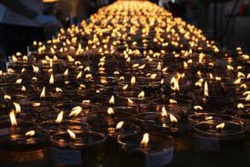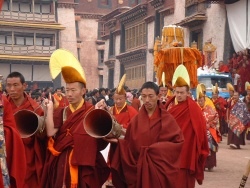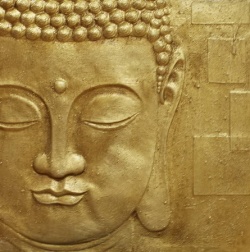Bodhisattva and Sunyata
In the Vimalakīrti Sūtra (維 摩 詰 經), the Middle way which is called the not-two Dharma-gate, or the Dharma-gate of non-duality. A few passages discussed this topic in a great assembly of Bodhisattvas.
"At this time Vimalakīrti said to all the Bodhisattvas, "Good sirs, how can a Bodhisattva enter the Dharma-gate of non-duality? Each of you with your eloquence please tell it as you like. . . "
Virtue-Top Bodhisattva said, "Defilement and purity make two. If you see the real nature of defilement, you [will realize that] purity has no form, then you conform to the character of cessation. This is entering the, Dharma-gate of non-duality. . ."
Good-Eye Bodhisattva said, "One mark and no mark are two. If one knows that one mark is no mark, and yet does not cling to no mark, he penetrates into the state of equality, and is said to have entered the Dharma-gate of non-duality. . . Pusya Bodhisattva said, "Good and evil make two. If you do not arouse good or evil, but penetrate to the limit of no-form, thus attaining the full realization, you enter the Dharma-gate of non-duality. . ."
Pure-Conviction Bodhisattva said, "The conditioned and the unconditioned dharmas make two. If one can depart from all numbers, his mind will be like empty space; with pure Wisdom he encounters no obstruction whatsoever. This is entering the Dharma-gate of non-duality..."
Narayana Bodhisattva said, "Mundane and supra-mundane are two. The very nature of mundane is empty, which is the same as the supramundane. In them there is no entering, no coming out, no overflowing and no dispersing. This is entering the Dharma-gate of non-duality. . ."
Good-Wit Bodhisattva said, "Samsāra and Nirvāna make two. When one sees the nature of samsāra, then there is no samsāra, no bondage, no liberation, no burning and no relieving. He who understands this enters the Dharma-gate of non-duality..."
Lightening-God Bodhisattva said, "Insight and ignorance make two. The true nature of ignorance is insight itself. Insight cannot be grasped; it is beyond all numbers. To be equal in them without duality is to enter the Dharma-gate of non-duality. . ."
Delight-Vision Bodhisattva said, "Form and Emptiness of form are two. However, form itself is empty, not when it ceases to be, but by its very nature. In the same way, feeling, conception, impulses and consciousness are empty. . . He who realizes this is entering the Dharma-gate of non-duality. . ."
Jewel-Seal-in-Hand Bodhisattva said, "To like Nirvāna and to dislike the world make two. If one does not like Nirvāna nor loath the world, then there is no duality. Why is this so? Because if there is bondage, then there is liberation. If from the beginning there is no such thing as bondage, who would ever seek for liberation? He who realizes that there is no bondage and no liberation will have no likes or dislikes. This is entering the Dharma-gate of non-duality. . ."
Truth-Lover Bodhisattva said, "Real and unreal make two. He who truly sees, does not even see the real, how much less the unreal? Why? Because this is not something that can be seen by the eye of the flesh. Only the Wisdom-eye can see it, and yet for this wisdom-eye there is nothing seen or unseen. This is entering the Dharma-gate of non-duality..."
Thus, each and every Bodhisattva spoke in turn; then they all asked Mañjuśrī, "Please tell us, what is the Bodhisattva’s entering the Dharma-gate of non-duality?"
Mañjuśrī replied, "According to my understanding, to have no word, no speech, no indication and no cognition, departing away from all questions and answers is to enter the Dharma-gate of non-duality." Thereupon Mañjuśrī asked Vimalakīrti, "We have spoken, each for himself. Now, good sir, you must tell us what is the Bodhisattva’s entering the Dharma-gate of non-duality."
Then Vimalakīrti kept silent, without a word. Whereupon Mañjuśrī praised him in earnestness, "Oh great, oh marvelousl Not to have even words or letters, this is truly entering the Dharma-gate of non-duality!"
"He who realizes that there is no bondage and no liberation will have no likes or dislikes."
"Emptiness is not a theory, but a ladder that reaches out into the infinite. "
Ashvaghoṣa (馬 鳴) said that Tathatā (真 如) is neither Śūnya (空) nor Aśūnya (非 空) nor both nor neither because it transcends all categories of the intellect. ‘All things in the world from beginning are neither matter nor mind (empirical ego), nor consciousness (momentary and individual), nor non-being, nor being; they are after all, inexplicable.’414 But this does not mean that there is no reality because it is the Real itself which appears ‘The divine nature of the Absolute Reality is not unreal.’
The Śūnyavadins take ‘existence’, ‘is’, ‘affirmation’, ‘being’ in the sense of absolute existence or ultimate reality; it means Eternalism. Those who maintain that the world exists are committing a great error because when we penetrate deep we find that this entire world with all its manifold phenomena is essentially relative and therefore ultimately unreal. And those who advocate non-existence or non-being are also committing a great error because they are denying even the phenomenal reality of the world. They are condemned by the Śūnyavadins as nihilists (nāstikas,
虛 無 主 義 者). Eternalism and Nihilism are both false. Intellect which is essentially discursive, analytic and relational involves itself in contradictions. All that can be grasped by it is essentially relative. It gives us four categories—existence, non-existence, both and neither — and involves itself in sixty-two antinomies.415 It cannot give us Reality. Reality transcends all the categories and reconciles all the antinomies of intellect. It is to be directly realized through spiritual experience. It is the Non-dual Absolute in which all plurality is merged. We must rise above the subject-object duality of the intellect and the plurality of the phenomena.
"All things in the world from beginning are neither matter nor mind..." the word "from beginning" should be there's No beginning. its called Beginningless 無 始.
The Unreality of that which is Beginningless and Endless (anavarāgraśūnyatā,無 始 , 無 終 的 不 實 本 質). This mode of Śūnyatā is similar in character. It applies to distinctions in time such as beginning, the middle and the end. These distinctions are subjective. We can say that nothing stands out rigidly on the beginning, the middle and the end, the times flow into each other. Consequent on the rejection of the beginning etc. the beginningless too turns out to be notional; and it should be recognised as relative or unreal on the account.
Beginningless 無 始 is not long long time ago, but at this very moment. A single deluded thought, a Buddha becomes sentient being, a single awakened thought, sentient being becomes Buddha. and a thought 一念 is a trillion fraction of a second.
Beginningless also mean its unreal, false reality. like a dream. dream also do not have a beginning. Is the beginning of the dream 6 billion years ago? we cannot find a beginning in our dream. wake up.



